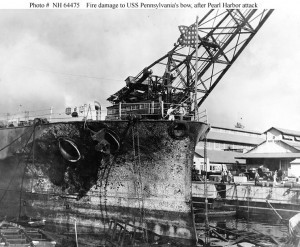Interview with a Pearl Harbor survivor
Pearl Harbor: A Survivor Talks About
Then and Now
by Ed Wolfe 12.07.01
(Bandon, OR) – Once there was a young, Vermont farmboy who wanted to be a sailor. His father had been in the military before him and his mother supported her son’s wishes to follow in her husband’s footsteps. In 1940, there weren’t politically correct admissions standards for the U.S. military. You made the grade, or you didn’t get in. And just being physically fit wasn’t good enough. The armed forces wanted big, strong, young men to populate their ranks. This particular young man weighed in at just over a hundred pounds and was rejected for service in the Navy.
Determined to enlist, his mother put him on a weight-gain diet and on the day of his third enlistment attempt she stuffed him full of bananas and water and got him to successfully weigh in at the minimum required weight of 110lbs. After boot-camp, which he was told he’d never make it out of, he was sent cross country from Norfolk, VA to Long Beach, CA to serve on the U.S.S. Ranger.
 U.S.S. Ranger
U.S.S. Ranger
Sixty-two years later, this sailor looks back over a long and interesting life that includes such memorable events as shaking the hand of the ‘leader of the free world’ and getting shot off the U.S.S. Arizona at Pearl Harbor.
What follows is a candid interview with one of America’s unsung national treasures – George Miller. Although we present this interview to you on the anniversary of the Japanese attack on Pearl Harbor, it isn’t George’s status as a Pearl Harbor survivor that makes him special. The greatest thing about George is that he’s, well… George. We were interested in talking to him and did so because of his unique experience, but aside from Pearl Harbor and World War II, George is also a man who’s lived in completely different eras in our nation’s history and has come through this long, slow time-travel with his mind and memories intact. He remembers what this country used to be like; what people used to be like and what a free country we once had. In this interview, George Miller discusses his Pearl Harbor experience, politicians, the attack on the World Trade Center towers, the decline of America, and plenty more. We hope you enjoy it and find some food for thought. We also thank George’s family for letting us take the time with him for this interview. – Ed Wolfe
SierraTimes: What was the first memorable thing you experienced in the Navy?
GeorgeMiller: One Saturday morning during inspection [on the Ranger] we were lined up according to size, and naturally, I’d be clear down at the end because I was the smallest. Along came this entourage of brass and civilians on the flight deck, inspecting us. This man stopped in front of me in civilian clothes and asked me where I was from. I said, “Woodstock, Vermont, sir.”
He said, “You’re not very big, are you?”
“No. I’m not.”
He said, “Well, it’s not the size of a man, but the size of a man’s heart that makes a good sailor,” then he shook my hand. That was Franklin Delano Roosevelt.
From there, they shipped me cross country from out of Norfolk, Virginia to Long Beach, California where I boarded the U.S.S. Arizona.
 U.S.S. Arizona
U.S.S. Arizona
I was tickled about that because my Daddy served on there as a marine in World War I. We left Long Beach and we got to Pearl Harbor where the Arizona didn’t want me and the Ranger didn’t want me so they transferred me to the U.S.S. Pennsylvania. Most of my class is on the Arizona at this time. But again, being one of the small guys, they got rid of me and a couple others.
ST: You were the runt of the litter?
GM: You got it!
Well, we fiddle-diddled around in Hawaii of course, as all sailors do in peace time and so forth. And being as young as I was, I didn’t hear anything about war or know anything about war. I’m sure the older people did, and maybe even the civilians at home did. I don’t know.
ST: But it wasn’t the talk of the ship at the time?
GM: No… [On Saturday, December 6th] I got liberty and went back over to the Arizona to be with my buds and to get some civilian flight training. I wanted to get a pilot’s license. I stayed overnight; me and my buds and the following morning they had church services. If you go to church service, which starts at 8 o’clock; ends at 9 o’clock, that means you can go on the beach. Otherwise, you have to stay aboard and work. It wasn’t a case of being religious, it was more a case of getting on the beach and having some fun.
So while we were standing on the quarterdeck, we were in dress whites – I don’t think you’ve ever seen them, and that’s the last time I wore ‘em. We were on the quarterdeck, that’s where you come aboard the ship from the gangway. Then something happened – and we was in the water. There was fire and oil and so forth…
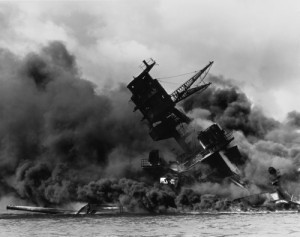 U.S.S. Arizona
U.S.S. Arizona
ST: That was Sunday morning?
GM:Yeah. December 7th. Sunday morning. And of course, you don’t know what happened. There was no way of knowing what happened.
ST: You didn’t hear anything before the attack?
GM: No, we were gabbin’. You know how guys gab.
ST: Was this after church?
GM: No. Before – it hadn’t started yet. About five minutes before church started.
ST: So, you were going to go to church and play on the beach and the next thing you know, you’re in the water.
GM: Yeah! And I never knew how I got out of the water. I made it back to the Pennsylvania okay and made it up to my battle-station. But I never knew how, because it was really about a nautical mile from the Arizona to where the Pennsylvania was in dry dock. And it was 50 years later that I found how. This ensign was running around in a captain’s [boat.] This was a real fine boat, all dolled up for captains and admirals, ya know, and he went around fishin’ guys out of the water, and I was one of ‘em.
ST: So you went from standing on the quarterdeck of the Arizona, into the water, then back on your own ship, the Pennsylvania and didn’t have any idea what was going on?
GM: Yeah. And of course, your readers know the rest of the story.
ST: Were you unconscious and then just woke up back on the Pennsylvania?
GM: No. I was never unconscious as in a state of being unconscious and helpless. I might’ve not known what the hell was going on.
ST: Were you shell-shocked?
GM: I would say ‘bewildered.’ That would be a better word.
ST: Did they pull you out of the water and pump water from your lungs?
GM: No. Not to my knowledge.
ST: So you found yourself on the Pennsylvania, kinda dazed?
GM: Oh yeah, oh yeah. Definitely. but you work by instinct from your training and the first thing you think about is getting back to your own battle station. You have a feeling of, ‘Boy, that’s the place to be. That’s gonna be the safest place.’ Which is of course, not true.
By the time the second wave came, I’d made it up to what we called ‘the bathtub’ – that’s the highest portion of the ship. It had four machine guns up there – water-cooled, .50 machine guns. The only problem was, the Pennsylvania was in dry-dock and there was no water. We laid into ‘em anyhow. We were shooting. We got some shells off. And I thought I got one of them Jap planes, but so did the other three guys, so they awarded us each a quarter of a plane.
After the raid was over, that was really the horrible part. Because we had to take care of all the people that were deceased.
ST: So, while most people would think that the worst part of the experience would be getting attacked, at that time, your adrenaline’s rushing, you’re engaged in activity…
GM: Yeah. There’s not a soldier, sailor, marine or anybody during a time of action that knows what the hell is going on. Because the word is ‘survival.’ People lost their lives. You don’t give a shit who the President of the United States is, who’s Republican, you don’t care who’s a Democrat, you know, you worry about who you are and who’s the guy next to you.
ST: Just recently, at least three of our soldiers were accidentally killed by one of our own bombs…
GM: Oh, I predicted that. I told Mrs. Miller that two, three days ago. That happens all the time.
ST: We could have guys doing special ops that others don’t know about in a target area?
GM: Let’s be honest; Men in uniform are the toys of politicians, no matter how the hell you look at it. There isn’t one damned politician in uniform over there fightin’. You know it and I know it. And they’re blowin’ a lot of smoke.
ST: So this is a regular occurrence then? Guys getting hurt by our own munitions?
GM: Oh sure! Happens all the time. Friendly fire? Happens all the time.
ST: It seems like whenever we have a reported casualty in some military operation, It’s usually the result of a freak accident while unloading a stove from the back of a truck, or the amount of people killed is initially smaller than it actually turns out to be later…
GM: I know what you’re saying. You’ve got to understand something. You heard on TV, well, you know, ‘he lied,’ ‘he didn’t tell the truth,’ ‘be sure to take an oath,’ – well, hell – Everyone’s a liar. So are politicians, so’s the President of the United States, so’s guys in uniform. I mean, anyone that tells you anything is a liar. So, that’s the end of that story. You know they lie. [laughs]
I think what’s disturbing out this is that they made [the World Trade Center attack] sound like a Pearl Harbor, when it isn’t even close. And listen, I have all the sympathy and feeling in the world for the people that were killed there in those buildings. Believe me. But remember something, the federal government was formed for one reason and one reason only: to protect the 50 states that we have now. They didn’t do it – at Pearl Harbor, and they didn’t do it now! They screwed up! So, what did they do? They covered it up real fast. Didn’t they?
ST: They always cover their own asses.
GM: You heard what they said: ‘This is war. This is…’ What the hell does Bush know about war??
ST: How would you compare what Bush knows about war versus what FDR knew about war?
GM: FDR didn’t know anything about war. He was just a fantastic politician. That guy could twist a knot better than anyone. I loved him. For twelve years of my life, he was my President. And I’ll back Bush too. He’s my president. I don’t have to like him.
ST: What if Clinton was in office conducting this “war.” Would you back him?
GM: Well, you gotta look at it from [my viewpoint]. I’m 80 years old, and I’m tired of boys becoming president. It’s not good for the country. It really isn’t. You have to have more maturity than that. And we don’t have an elected president. We have a selected one.
ST: Do you think the 35 year old age requirement to become president is too young?
GM: Oh, sure! Sure. All you have to do is listen to him on TV. Listen to him talk. He’s a broken record. Same thing, over and over and over. But like I say, this is our system and I’ll protect it, and I’ll back my president and I’ll back those politicians – but I don’t have to like them.
ST: How would you compare the casualties at the World Trade Center with the number at Pearl Harbor?
GM: ‘Bout half. Bodies? – about half. We also lost a bunch of ships, and so forth. The difference now is this is people fighting against a certain class of people. Then, it was a country against a country…
ST: That’s a weird thing about this war. We’ve never declared war against Afghanistan and yet we’re committed to knocking out their governing body.
GM: I really don’t give a damn what they do over there and I’m gonna tell you why. Those people have been around. We’re a very young country. I’m 80, so I’m almost half the age of this country. We’re a little over 200 years old. China’s what? 5,000, 6,000 years old. We’re babies. We’re still growing in the eyes of those people and their leaders and so forth. They’re just waiting for us to stub our toe, to stumble. Anybody on top usually gets knocked down. You know, that’s the philosophy.
ST: It’s been said that Japan brought about the destruction of Germany by attacking Pearl Harbor. Now a comparison is being made that Bin Laden has brought about the destruction of the Taliban by attacking New York.
GM: That could be.
ST: But wouldn’t that presuppose that there’s a possible end to a so-called war on terrorism.
GM: There never will be an end to terrorism!
ST: That was going to be my next question. We were able to bring about an end to Germany as it existed at that time, but how do we bring about an end to people fighting for a religious ideal or concept?
GM: There’s a baby being born today that will be a terrorist. There’s a baby being born today that will be a doctor or a lawyer. Every generation has its downside.
ST: Especially when you have kids growing up today in Afghanistan being told that the United States killed their daddy.
GM: Well, that’s what they’re taught. We are what we were taught as kids. Let’s not kid ourselves. Your faith is what your mom and daddy told you. Your schooling is what your mom and daddy helped or didn’t help you with.
ST: And they’re already taught over there that America is the great Satan, so that’s compounded now by the death of loved ones caused by Americans…. So there could never be an end to a war on terrorism.
GM: Of course! What did we do when they bombed Pearl Harbor? What’d we say to that? I didn’t even know what the hell the Japanese was until the propaganda came out. Holy Heck! They had them raping my mother and my sisters and everything else – pictures all over the place gettin’ us mad.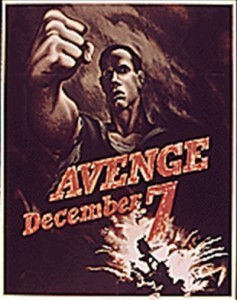
ST: I imagine that back then, people called the Japanese any name they could think of…
GM: Some still do.
ST: Do you think that in today’s military, soldiers are not allowed to use names such as towelhead or camel jockey or whatever derogatory nicknames as soldiers have always done in wars?
GM: They can’t do that now. That’s one of the freedom’s that’s gone now.
ST: In your 80 years of life, what other freedoms would you say you’ve lost?
GM: I can’t go anyplace without feeling that I’m in a police state.
ST: Most people today wouldn’t know that…
GM: No, there’s no way of knowing. I wouldn’t blame them.
ST: What do you think of the news today?
GM: You know, I told Mrs. Miller, ‘Gee, I always thought we were the only ship fighting in the South Pacific till I came back home after the war and saw Victory at Sea and I said, ‘Gee, there was other ships? Wow! I didn’t know it was that big!’
[laughter]
ST: How about modern news reportage compared to the news 40 or 50 years ago?
GM: The media today has a bunch of idiots. An example, this morning on CNN. I forget who the lady is, a pretty lady and all that. [In a stupid sounding falsetto:] ‘How did you feel about your brother being killed when you first heard it? Give me your inside feelings….’ My wife and I go up the wall when we hear that. [laughs]
ST: Were reporters that stupid when you were younger, listening on the radio?
GM: They weren’t like that. They were really factual people. CNN does it because they have to fill time slots. Walter Winchell – he didn’t have to fill anything.
ST: I talked to a guy once who said he was at Pearl Harbor and that he knew for a fact that we knew in advance about the imminent attack on Pearl Harbor but that there was deliberately no warning given so that the attack could be used as a justification for entering the war in Europe.
GM: Oh, there’s no hush-hush about that. There’s a book that’s been written on it. We knew we were gonna get hit, but they didn’t know where it was gonna happen.
ST: I guess it might be a conspiracy theory then that we knew the exact location where the Japanese were going to attack. Apparently FDR promised during his campaign that he would not bring our country into the war, but then allowed the Pearl Harbor attack to take place so that Americans would demand that he break his word and enter us into the war.
GM: Well, that’s what you’re hearing now. How much of that is true – I don’t know. I think Churchill had something to do with that. He wanted us in. We were isolationists. I can’t remember the name of the book I read about it, but if you ever pick it up, all your questions will be answered. And in the back of the book, he had a statement in there that there is still stuff that the United States Navy will not release.
ST: Stuff dating back to WWII?
GM: Yes. A lot has been released under the Freedom of Information Act. But to have things remain secret is a piece of cake. I worked for the government at one time. Everybody had Secret stamps. If you didn’t want anything to go anyplace, you went [stamps an imaginary paper] ‘Top Secret’. It could be a piece of toilet paper and it would still be Top Secret. That’s common. They do that all the time. That’s another freedom we’ve lost. It used to be you could know what was going on.
ST: It seems to me that there was a time when reporters would resent being given “spin” and they worked to find out the truth of a matter. Now they see it as their duty to deliver the spin to us as provided to them by the White House. What happened to the old style, real reporters?
GM: That kind of guy – the classy reporters are gone. Today, it’s showmanship. It’s a big difference. You can blame the boob tube – a lot of these reporters today were born with that. That’s the only life they know.
ST: Getting back to the World Trade Center…
GM: I had a guy come up to me and ask me what I thought about the towers being hit. I said it was a terrible tragedy. Just terrible. But I said to him, ‘You’re talking to a guy whose generation saw England bombed. France bombed. Germany all wiped out. Japan. We’ve seen it before.’ It is terrible. But what’s the motto of Pearl Harbor survivors?
ST: I don’t know.
GM: Stay alert. Keep America as it always has been, and it always will be. But they didn’t do it. They screwed up. But you can’t blame anyone. We had a president before this one, and one before that one, ya know. You have to say that the federal government who was supposed to protect these states – these independent states – that’s what we are – we have different laws. The only laws that are the same over all the states are the federal laws….
ST: Do you think the federal government is too busy being involved in all the duties that it’s taken upon itself rather than doing the specific 19 things delegated to it by the people?
GM: When they take it upon themselves, that’s terrible. And sometimes they do. But what happens is when John Doe citizen or Mrs. Citizen says, “There oughta be a law… I’m gonna tell my congressman. I’m gonna tell my senator.” Then the politician tries to appease him, and he gets [the law] through. What’s that mean? 50% like it and 50% don’t like it. I had a judge tell me that the minute they pass a new law, there’ll be five thousand new people in jail.
ST: Every time you pass a new law, you make a new class of citizens into criminals that weren’t criminals the day before.
GM: You got it. You see, what was permissible when I was a boy isn’t permissible today, but that doesn’t mean we were criminals then.
ST: Like bringing guns to school today.
GM: [laughs] You know, I’ll tell you something. Before going to Vermont, I lived in New York City in Brooklyn. And the Mafia was running everywhere, Dillinger was running around, BabyFace Nelson, you know, they were shooting each other up and all that stuff, but they didn’t bother civilians with their crap. And we had cops all over the place, walking the streets. They had their own streets. A city block was mighty long. And I never saw a city cop with a gun.
ST: They didn’t have them?
GM: I’m sure they probably had them underneath their long coats, 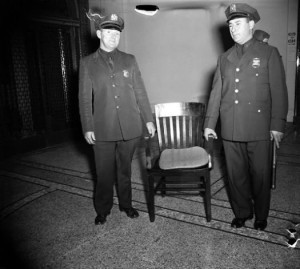 but I never saw one. Now you look on TV – God, I saw a woman policeman who looked like she was a Green Beret. [laughs]
but I never saw one. Now you look on TV – God, I saw a woman policeman who looked like she was a Green Beret. [laughs]
ST: Have you seen the ones that look like some kind of armed, commando ninjas?
GM: Ever since Viet Nam, they’re all dressed in fatigues, and when they surround a building, God Almighty, they have 50 cars and it’s all for one or two guys inside.
ST: Speaking of the loss of liberties in our country, what do you think of the USA PATRIOT Act that’s supposed to increase the government’s power to track down terrorists?
GM: I don’t like anything that gives the federal government more power. I don’t like that. If they can specifically say that it will protect the 50 states – it doesn’t say Florida, it doesn’t say Vermont, or Texas, any of the 50 states – if they could come up with something that would do that, I’m for it. But what they do is say, ‘let’s try this and see how it works. Let’s just try this.’
ST: The government’s response to every crisis situation is to grant itself more power to prevent situations that the excessive power they’d previously granted themselves was insufficient to prevent, because the solution is never more power for the government, so it’s a never ending cycle.
GM: You gotta be careful how you say that. You’re saying ‘government.’
ST: Federal government.
GM: The federal government is made up of people. Like you and me.
ST: But we’ve also got various law enforcement agencies, the Justice Department – and they want less restraint.
GM: Americans love to screw each other. I don’t understand it. I’ve been to other countries and gee, those people love to get along with each other. For some reason, over here, “You sonofabitch! I’m gonna sue you!” “I’ll blow your brains out!”
[laughing]
GM: What the hell’s the matter with us?
ST: Are we just more combative than other people?
GM: Of course we are. Are you kidding? That’s our nature. Because that’s the way we was raised ever since Paul Revere started riding from the British. You know, after we got through with the British, we took care of the Indians…
ST: I read that our country has been involved in more military operations than any other country on earth, but many of them we wouldn’t know about…
GM: Since WWII, there’s been over 350 wars on this planet.
ST: We say we’re a peace-loving nation, and yet we’re always involved in, if not an actual war, some type of military “conflict” or operation somewhere.
GM: That’s the biggest mistake we ever made, when we became the police force for the entire world. And that’s why you get people P.O.’d at you.
ST: You said earlier that when someone wants a new law, lawmakers will try to appease people and pass the laws. Do you think that perhaps the federal government has been involved in that type of thing, not only in this country, but world-wide appeasement and thus creating problems as a result of not focusing on those specific duties that the government was instituted to perform?
GM: Let me throw this at you. Just prior to those planes hitting those buildings, all over the news were stories about some senator [Gary Condit] screwing some girl [Sandra Levy] who then disappeared, and mom and pop were on TV all the time. They still haven’t found her. The next day, you never heard a word and I haven’t heard a word about him ever since. And they’re not even thinking about firing this guy. Now, doesn’t that answer a question for you? What do we really care about? Dramatization. Ya know? ‘It sells! It sells!’
ST: It’s almost like ambulance chasing.
GM: There ya go. That’s a good way of put
ting it.
ST: Like this morning there was a shooting at a workplace in Goshen, Indiana and that became the big ‘breaking news’. Reports of a hundred officers on the scene. SWAT teams there. Up to thirty-five people shot….
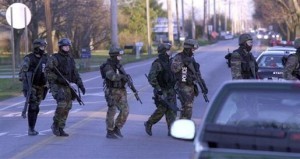 Police in Goshen, Indiana at the Nu Wood shooting
Police in Goshen, Indiana at the Nu Wood shootingGM: Localization has been taken away from us. When I was a boy, running around Brooklyn, do you think Texas gave a damn what John Dillinger was doing in New York?
ST: No.
GM:Hell no, they didn’t. Texas had their own Rangers chasing someone else. Each state in the country was taking care of its self. Now, we’re becoming a state. Not fifty – we’re becoming one state.

